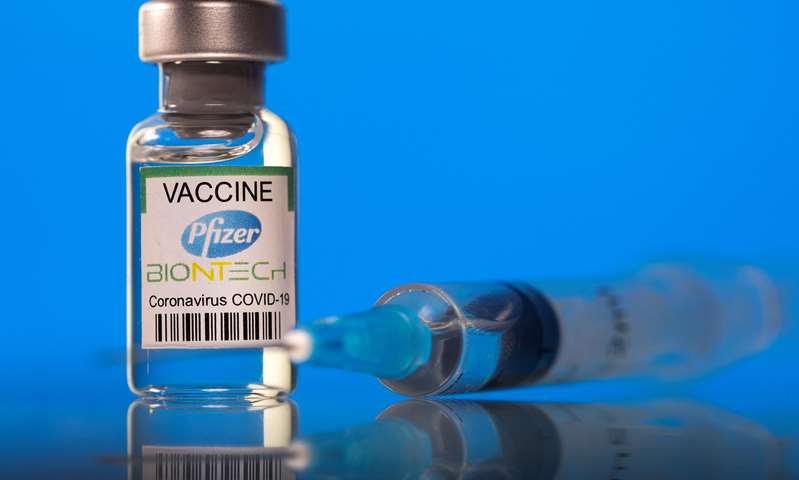Pfizer has admitted it could ditch German firm that made its Covid jab










Pfizer has admitted it could ditch German firm that made its Covid jab
Reference: Connor Boyd Assistant Health Editor For Mailonline
Pfizer has admitted it may ditch the German biotech firm that made its breakthrough coronavirus jab as it looks to drastically expand its vaccine business. The US drugs giant has revealed plans to use gene-based technology, harnessed by BioNTech, to tackle other viruses and illnesses beyond Covid.
Pfizer's boss claimed the firm had learned enough about mRNA vaccines to go solo, adding that it no longer 'needs to work with BioNTech' beyond the end of the companies' flu jab agreement in July. Albert Bourla, the firm's chief executive, revealed the company had recruited at least 50 more scientists to work out of its new mRNA-focused lab in New York.
It has also secured specialised raw materials and designed clinical trials so that it can manufacture and study vaccines without splitting profits. Mr Bourla told the Wall Street Journal: 'We like working with BioNTech, but we don’t need to work with BioNTech. We have our own expertise developed.'
The German company was the brains behind the Covid jab, which was proven to be 95 per cent effective at blocking Covid symptoms and became the first in the world to get approval in December when Britain gave it the green light. Pfizer, most famous for inventing Viagra, came on board to manufacture, distribute and commercialise the vaccine.

The two companies are currently splitting profits on the Covid jab evenly, with sales expected to return roughly £13billion this year. BioNTech seemed unaffected by the news in a statement and said it welcomed the 'acknowledgement' of the technology it had developed.
Analysts at JP Morgan forecast more than £8.5bn in sales for the jab next year, which will increase if annual booster shots are needed. BioNTech is expected to supply one billion doses of the jab this year, a target that increased by a quarter when it got approval for its factory in Marburg, Germany.
And Pfizer is matching this with another billion, bringing the pair's total to two billion. A BioNTech spokeswoman told the WSJ: 'We consider it a great acknowledgment for mRNA technologies that companies such as our partner Pfizer are getting involved into building their own mRNA vaccine strategy.'
The two firms first began to collaborate in 2018 with the aim of making a flu vaccine. But that original deal expires this July, at which point Pfizer will continue to research, manufacture and sell any jab proven to work.
Scientists say mRNA vaccines are cheaper to make and easier to modify in the face of new variants or viruses. The process of developing mRNA vaccines is also purely synthetic, meaning experts don't have to rely on living cells from plants or animals.
Making mRNA vaccines requires special equipment and raw materials that weren’t commonly available before Covid hit. Pfizer/BioNTech's Covid jab was the first ever mRNA vaccine to get approval for fighting any disease. Rival American firm Moderna has also created an mRNA jab proven to thwart coronavirus.
Pfizer's boss said it has become self-sufficient after learning how to produce mRNA vaccines itself, without relying on suppliers. The New York-based firm, which is one of the world's biggest pharmaceuticals, has declined to say which viruses it will target next with the mRNA technology.
But it's likely booster coronavirus shots will be needed in the future as new variants emerge. The global flu vaccination market is also valued at about £3bn. Pfizer’s vaccine portfolio already includes one of the most profitable jabs on the market — the pneumonia vaccine Prevnar 13. It made Pfizer nearly £4.3bn in sales last year.
It is also using traditional vaccine technology to develop shots for Lyme disease and colon infections. Traditional vaccines use one harmless, typically inactivated virus - such as the types that cause common colds - to teach the immune system to recognise the threat and kill it in future.
Studies have found that, although the mRNA vaccine was relatively untested, it appears to have been a huge success in the pandemic. A study in the UK found a single dose of Pfizer's jab produces a 'robust' immune response in 99 per cent of people.
The study was done on 237 health workers in Sheffield, Oxford, Liverpool, Newcastle and Birmingham. Most volunteers were female. It measured levels of both antibodies and T-cells, which are substances used by the immune system to destroy the coronavirus. Higher levels generally mean stronger immunity. Scientists found that, after one dose of the vaccine, people who had been infected with Covid in the past had 6.8 times as many antibodies in their blood as those who had not.
They had 2.9 times as many antibodies after one dose as people who had not been infected but who had been given two jabs, the total vaccine course.But the experts said second doses are still needed for everyone because the booster is thought to make immunity last for longer. And the scientist behind Pfizer's vaccine now says the technology could soon be used to fight cancer.
Ozlem Tureci, who co-founded BioNTech with her husband, was working on a way to harness the body's immune system to tackle tumours when they learned last year of an unknown virus infecting people in China. And within 11 months, Britain had authorised the use of the mRNA Covid-19 vaccine they developed with US pharmaceutical giant Pfizer, with approval from the US following a week later.
Tens of millions of people worldwide have received the shot since December. 'It pays off to make bold decisions and to trust that if you have an extraordinary team, you will be able to solve any problem and obstacle which comes your way in real time,' Tureci said.
Among the biggest challenges for the small, Mainz-based company that had never brought a product to market before was how to conduct large-scale clinical trials across different regions and how to scale up the manufacturing process to meet global demand. Along with Pfizer, the company enlisted the help of Fosun Pharma in China 'to get assets, capabilities and geographical footprint on board, which we did not have,' Tureci said. Among the lessons she and her husband, BioNTech chief executive Ugur Sahin, learned along with their colleagues was 'how important cooperation and collaboration is internationally.'
Tureci, who was born in Germany to Turkish immigrants, said the company, which has staff members from 60 countries, reached out to medical oversight bodies from the start, to ensure that the new type of vaccine would pass the rigorous scrutiny of regulators. 'The process of getting a medicine or a vaccine approved is one where many questions are asked, many experts are involved and there is external peer review of all the data and scientific discourse,' she said.
No thoughts on “Pfizer has admitted it could ditch German firm that made its Covid jab”
Articles - Most Read
- Home
- LIVER DIS-EASE AND GALL BLADDER DIS-EASE
- Contacts
- African Wholistics - Medicines, Machines and Ignorance
- African Wholistics -The Overlooked Revolution
- African Holistics - Seduced by Ignorance and Research
- The Children of the Sun-3
- Kidney Stones-African Holistic Health
- The Serpent and the RainBow-The Jaguar - 2
- PART ONE: DIS-EASE TREATMENT AND HEALTH-3
- 'Tortured' and shackled pupils freed from Nigerian Islamic school
- King Leopold's Ghost - Introduction
- PART ONE: DIS-EASE TREATMENT AND HEALTH-4
- PART ONE: DIS-EASE TREATMENT AND HEALTH-2
- PART ONE: DIS-EASE TREATMENT AND HEALTH-5
- African Wholistics - Medicine
- Menopause
- The Black Pharaohs Nubian Pharaohs of Ancient Egypt
- The Mystery System
- PART ONE: DIS-EASE TREATMENT AND HEALTH-6
Who's On Line?
We have 87 guests and no members online
Ad Agency Remote
Articles - Latest
- The Male G Spot Is Real—and It's the Secret to an Unbelievable Orgasm
- Herbs for Parasitic Infections
- Vaginal Care - From Pubes to Lubes: 8 Ways to Keep Your Vagina Happy
- 5 Negative Side Effects Of Anal Sex
- Your Herbs and Spices Might Contain Arsenic, Cadmium, and Lead
- Struggling COVID-19 Vaccines From AstraZeneca, BioNTech/Pfizer, Moderna Cut Incidence Of Arterial Thromboses That Cause Heart Attacks, Strokes, British Study Shows
- Cartilage comfort - Natural Solutions
- Stop Overthinking Now: 18 Ways to Control Your Mind Again
- Groundbreaking method profiles gene activity in the living brain
- Top 5 health benefits of quinoa
- Chromolaena odorata - Jackanna Bush
- Quickly Drain You Lymph System Using Theses Simple Techniques to Boost Immunity and Remove Toxins
- Doctors from Nigeria 'facing exploitation' in UK
- Amaranth, callaloo, bayam, chauli
- 9 Impressive Benefits of Horsetail
- Collagen The Age-Defying Secret Of The Stars + Popular Products in 2025
- Sarcopenia With Aging
- How to Travel as a Senior (20 Simple Tips)
- Everything you need to know about mangosteen

